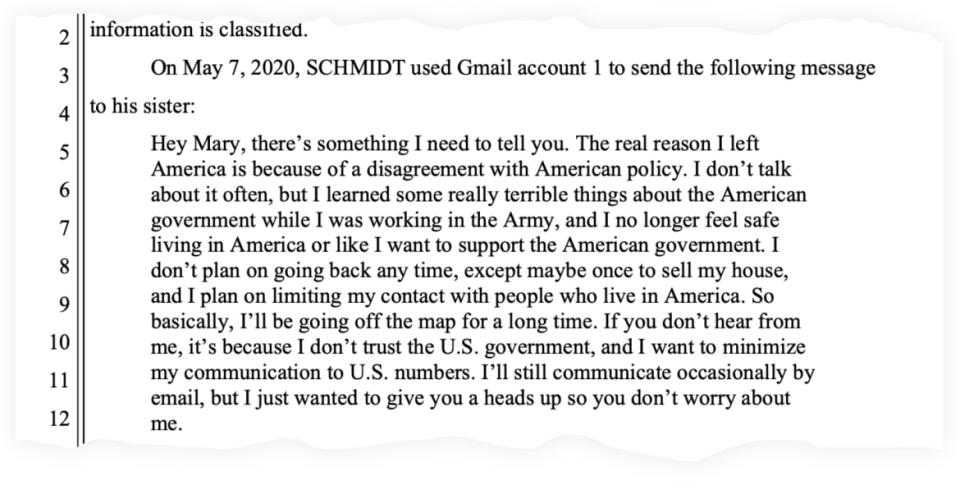Disaffected Ex-Army Sergeant Tried Brazenly to Sell Secrets to China, Feds Say

A former U.S. Army intelligence team leader who complained of learning “some really terrible things about the American government” hoarded years’ worth of national defense secrets and technology that he tried to share with China, according to a newly unsealed federal indictment.
Joseph Daniel Schmidt, 29, has been living primarily in Mainland China and Hong Kong since March 2020, just two months after separating from the military as a sergeant. Safely out of reach for U.S. authorities for more than two years, Schmidt was arrested Friday after landing at San Francisco International Airport. He is charged with attempting to deliver national defense information, and retention of national defense information. Each offense carries a sentence of up to 10 years in prison.
Schmidt’s alleged overtures to the Chinese began with a Feb. 24, 2020, email, according to an FBI affidavit that accompanies a detention motion filed Friday by prosecutors.
“I am a United States citizen looking to move to China,” Schmidt wrote to the Chinese Consulate in Istanbul, according to the affidavit. “I currently reside in Istanbul, and am trying to set up an appointment at the consulate in Istanbul. I also am trying to share information I learned during my career as an interrogator with the Chinese government. I have a current top secret clearance, and would like to talk to someone from the Government to share this information with you if that is possible.”
Schmidt then allegedly ran through the finer points of his service, listing “training in interrogation, running sources as a spy handler, surveillance detection, and other advanced psychological operation strategies.”
“I would like to go over the details with you in person if possible, as I am concerned with discussing this over email,” the email concluded. “I’m sorry for using English, but I want to make sure that I do not miscommunicate. Please contact me at your earliest convenience if I can set up a time to meet with you. Thank you, Joe Schmidt”
Schmidt, an active-duty soldier from 2015 to 2020 who studied Mandarin, was most recently assigned to the 109th Military Intelligence Battalion at Joint Base Lewis-McChord (JBLM) near Tacoma, Washington. He held Top Secret and SCI (Sensitive Compartmented Information) security clearances, according to the affidavit, and was assigned to a Human Intelligence (HUMINT) squad. Schmidt’s work “directly supported the Indo-Pacific Command, the U.S. Department of Defense’s geographic combatant command that covers the Pacific Ocean and Indian Ocean region, including the PRC,” the affidavit states.

In Dec. 2017, Schmidt took personal leave for a trip to China, the affidavit states, and wrote on his visa application, “I plan to travel to China every New Year to learn about Chinese culture… I would like to travel to China many times over the course of the next ten years.” He planned two more trips to China after that, but never went “for reasons unknown,” according to the affidavit.
Schmidt left the Army on Jan. 8, 2020, and transitioned to the Inactive Ready Reserves. Six days later, he flew to Beijing and stayed for four days, according to the affidavit, which does not specify what he did while in China. However, it says Schmidt left the U.S. again on Feb. 9, 2020, for a three-week trip to Istanbul, Turkey. While there, he emailed the Chinese embassy with his initial offer and ran Google searches for, among other things, “soldier defect,” “countries that dont extradite,” “russian visa costs,” “chinese embassy Istanbul,” and “can you be extradited for treason,” the affidavit says.
Two days after his first email, Schmidt allegedly created a Word document titled, “Important Information to Share with Chinese Government.” A later review by Army investigators of Schmidt’s iCloud account “determined that this document contains a variety of classified information that relates to the national defense,” the affidavit states.
Prosecutors say he then sent “several identical emails” to Chinese state media outlets, asking if they “would be interested in using any of my military stories in your paper. I have several years experience in military intelligence, and I think your audience would be very interested in reading some of these. Let me know if that's a possibility. Thanks!”
Schmidt returned to the U.S. on March 2, 2020 but turned around and left the country again on March 6, flying to Hong Kong, then Beijing for three days, then back to Hong Kong, which he used as a base of operations while trying to set himself up for a life on the mainland..
He would later email his sister back in the U.S., explaining why she wouldn’t be seeing him again for a while.

Schmidt had been trying to set up a life for himself in Mainland China, according to the FBI.
“Hey Mary, there’s something I need to tell you,” Schmidt wrote. “The real reason I left America is because of a disagreement with American policy. I don’t talk about it often, but I learned some really terrible things about the American government while I was working in the Army, and I no longer feel safe living in America or like I want to support the American government. I don’t plan on going back any time, except maybe once to sell my house, and I plan on limiting my contact with people who live in America.”
Schmidt told his sister he’d be “going off the map for a long time,” and told her not to be concerned by his going dark: “I’ll still communicate occasionally by email, but I just wanted to give you a heads up so you don’t worry about me.”
In Hong Kong, Schmidt continued searching online for suspicious terms, including “interrogation field manual” and “fm human intelligence,” and visited message boards on Reddit such as “What Do Real Spies Do and How are they Recruited,” the affidavit says. Schmidt also allegedly created another Word document, which spanned four pages and discussed aspects of “U.S. Army intelligence collection, dissemination, and training, including: the types of intelligence reports that are prepared and disseminated; methods of conducting interrogations; methods of conducting human source operations; and the types of training courses offered for HUMINT officers.”
The information in this specific instance was unclassified, but still potentially harmful to U.S. interests because of the highly sensitive subject matter, the affidavit states, citing an unnamed Army official.
Location data showed Schmidt’s phone “in close proximity” to Ministry of State Security (MSS) headquarters in Beijing on March 10, 2020, according to the affidavit.

Schmidt searched for driving directions from the Beijing airport to MSS headquarters, according to U.S. authorities.
The following day, Schmidt searched Google for maps of U.S. military installations he had visited while on active duty. And when he got back to Hong Kong, he “continued his espionage activities,” dumping further classified information into yet another Word document titled “High Level Secrets,” written in Chinese characters. The affidavit says the rest of the document was written in English, and said, “If you read this… please make sure that the State Security Bureau of People’s Republic of China receives it. The content is a high level secret of U.S. intelligence and can help the Chinese people.”
Schmidt said that before leaving the Army, he was working on “a project with technology that is very compartmentalized, to the extent that the majority of people in the intelligence field are unaware of its existence,” according to the affidavit. “I will only discuss this technology in person if I can meet with a qualified member of the Chinese Security Bureau.”
The affidavit says Schmidt provided his military ID and service record to prove he was who he said, and offered to help the Chinese design training programs to mimic U.S. courses and to help Chinese operatives “more effectively identify American Spy Handlers.” He subsequently contacted an unidentified Chinese state-owned enterprise and offered them a “Secret Internet Protocol Routing PKI token,” a type of card U.S. intelligence agencies use to access SIPR, the intelligence network with secret information.
“It is a very rare card to find outside of the intelligence community, and if used properly, it can improve China’s ability to access the SIPR network,” Schmidt allegedly wrote in an email. “If I give you card, can you look into the security algorithms that it uses for me? By the way, I’m sorry my Chinese is so bad. I don’t know how to translate most of this terminology, and I appreciate your patience… Thank you!! Best regards, Joey.”

Schmidt was most recently assigned to an intelligence unit at Joint Base Lewis-McChord in Washington State.
Schmidt continued to compile documents, even creating a 28-slide PowerPoint presentation titled “Use of Technology in Military Source Operations and Interrogations.” He tried to set up a meeting with a second state-owned entity in Beijing, while looking for work in China, which the feds say had stalled due to the COVID-19 outbreak.
It is unclear if Schmidt, who finally received a Chinese work permit on Aug. 7, 2020, was successful in getting an audience with Chinese spymasters. He stayed in Hong Kong as he prepared to relocate to the mainland, and remained just out of reach for U.S. authorities—until Friday, when he flew to San Francisco and was arrested at the airport.
“Members of our military take a sworn oath to defend our country and the Constitution. In that context the alleged actions of this former military member are shocking—not only attempting to provide national defense information, but also information that would assist a foreign adversary to gain access to Department of Defense secure computer networks,” Tessa M. Gorman, acting U.S. Attorney for the Western District of Washington, said in a statement. “I commend the FBI for their diligent work to end his alleged efforts to betray our country.”
Laws against the retention of national defense materials, whether distributed to enemy agents or not, have recently ensnared a retired Air Force lieutenant colonel, a 21-year-old National Guardsman, and the 45th president of the United States.
Schmidt does not yet have a lawyer listed in court records, and was unable to be reached for comment.
Get the Daily Beast's biggest scoops and scandals delivered right to your inbox. Sign up now.
Stay informed and gain unlimited access to the Daily Beast's unmatched reporting. Subscribe now.

